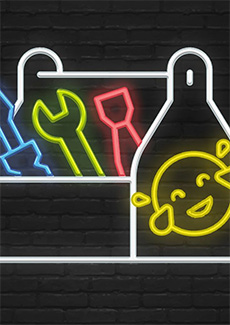Jung at heart: developing your stand-up comedy persona

When I help comedians (and all kinds of speakers) develop their persona, I work with Jungian archetypes. By using these archetypes as a starting point, stand-up comedians can gain a better understanding of themselves and their comedic potential, ultimately leading to a stronger and more engaging stage persona.
Archetypes provide a framework for you, the stand-up comedian or speaker, to explore different aspects of your personality and see which resonate most strongly with audiences. Once you identify with an archetype you embody, you can exaggerate certain traits of yourself to create a more distinct and memorable persona. You can also add contrasting archetypes to add complexity to your act. (For more on combining archetypes, see below.)
Let's look at the Jungian archetypes and think about them in terms of stand-up comedy. These archetypes were developed by Swiss psychiatrist Carl Jung. These archetypes represent fundamental human experiences and motivations. By understanding these different Jungian archetypes, comedians can create more complex and relatable personas that resonate with audiences, and they can inspire topics for jokes and stories.
Here are the main Jungian archetypes and how they can inform your comedy:
The Innocent: This archetype represents someone who is pure, optimistic, and trusting. They often see the world in black and white and can be naive or gullible. If you're a comedian who embodies this archetype, try writing jokes and stories about your own naïveté or lack of experience in the world.
The Orphan: This archetype represents someone who has been abandoned or orphaned, either literally or metaphorically. If you're a comedian who embodies this archetype, try writing jokes and stories about feeling lost or alone, or about struggling to find your place in the world.
The Hero: This archetype represents someone who is brave, courageous, and selfless. They are often driven by a desire to help others and make the world a better place. If you're a comedian who embodies this archetype, try writing jokes and stories about overcoming challenges or standing up for what you believe in. You could also be a failed-hero and the comedy comes from this drive to make a difference, but how in reality you fail and make things worse.
The Caregiver: This archetype represents someone who is nurturing, compassionate, and supportive. They are often driven by a desire to care for others and make them feel safe and loved. If you're a comedian who embodies this archetype, you might write jokes and stories about being nurturing or supportive, or about the challenges of caring for others. This can also be about failed care where it's taken to a dysfunctional degree or where it went wrong.
The Seeker: This archetype represents someone who is curious, adventurous, and independent. They are often driven by a desire to explore the world and find their own path. If you're a comedian who embodies this archetype, you might write jokes and stories about your own curiosity or sense of adventure, or about your desire to explore the world.
The Lover: This archetype represents someone who is passionate, romantic, and sensual. They are often driven by a desire for love, intimacy, and connection. If you're a comedian who embodies this archetype you might write jokes and stories about love, relationships, or sexuality.
The Creator: This archetype represents someone who is innovative, creative, and imaginative. They are often driven by a desire to express themselves and make something new. If you're a comedian who embodies this archetype, you might write jokes and stories about your own creative process or about the challenges of being an artist. Or you might bring something new to the stand-up form itself!
The Ruler: This archetype represents someone who is powerful, authoritative, and responsible. They are often driven by a desire to lead and control others. If you're a comedian who embodies this archetype, you might write jokes and stories about taking authority, or responsibility, or where you are the sharpest and smartest person. You will also be high-status and will be in charge of the room.
The Sage: This archetype represents someone who is wise, knowledgeable, and insightful. They are often driven by a desire to learn and understand the world around them. If you're a comedian who embodies this archetype you might write jokes and stories that embody wisdom in some way, or that have a philosophical point.
The Jester: This archetype represents someone who is playful, mischievous, and humorous. They are often driven by a desire to make others laugh and have fun. If you're a comedian who embodies this archetype you could well be a one-liner comic, or a practical joker. Perhaps you tell stories about situations where you were playful or mischievous.
The Magician: This archetype represents someone who is transformative, charismatic, and persuasive. If you're a comedian who embodies this archetype you might write jokes and stories that are a transformative, taking everyday situations and making the impossible or incredible happen. You could also of course be a comedy magician!
The Rebel: This archetype represents someone who is independent, unconventional, and rebellious. They are often driven by a desire to challenge the status quo and make their own rules. If you're a comedian who embodies this archetype you might write jokes and stories that are unconventional, or rebellious. You might also break the rules of stand-up or disrupt the performance context and conventions.
You can use archetypes to explore different aspects of your own personality and comedic style. Of course, you combine different archetypes to create even more complex and interesting personas. For example, a comedian might be both a Jester and a Rebel, using comedy to challenge the status quo. Or how about a Creator-Lover or an Orphan-Seeker?
Ultimately, the goal is to use Jungian archetypes to create a stand-up comedy persona that is both relatable and unique. By understanding the different archetypes, comedians can tap into universal human experiences and create characters that resonate with audiences on a deeper level.
How do you identify your own archetypes? The best way is to sit down with other comedians (or, ahem, a comedy coach/director), have the list of archetypes to hand and ask them to reflect back to you which you embody on stage.
Chris Head - A Director's Guide To The Art Of Stand-Up

Stand-up: it's the ultimate solo art form. Yet, behind the scenes, you will increasingly find the shadowy figure of a director. For comics themselves and for those who support them, this is the first book to give the director's perspective on creating and performing stand-up comedy. Drawing on his own experience of directing stand-up alongside speaking to comedians and their directors, Chris Head produces a revealing perspective on the creative process, the comic's persona, their material, the structuring of shows and delivering a performance.
Directors interviewed include Logan Murray, John Gordillo and Simon McBurney, who between them have directed Eddie Izzard, Michael McIntyre, Milton Jones, Lenny Henry and French & Saunders. With a foreword by BBC arts editor Will Gompertz and contributions from many other interviewees including Oliver Double (author of Getting the Joke), Mark Thomas and Zoe Lyons, this is the only book that goes all the way from one-liners to theatre via comedy club sets and full-length shows.
Perfect for stand-ups from newbies to pros, students of comedy, academics studying and teaching stand-up and for directors themselves, A Director's Guide to the Art of Stand-up offers hundreds of inspiring practical insights and shows how creating the comedian's highly personal, individual act can be a deeply collaborative process.
First published: Thursday 12th July 2018
- Publisher: Methuen Drama
- Pages: 240
- Catalogue: 9781350035522
![]() Buy and sell old and new items
Buy and sell old and new items
Search for this product on eBay
BCG may earn commission on sales generated through the links above.
- Publisher: Methuen Drama
BCG may earn commission on sales generated through the links above.
Chris Head - Creating Comedy Narratives For Stage And Screen

This accessible and engaging text covering sketch, sitcom and comedy drama, alongside improvisation and stand-up, brings together a panoply of tools and techniques for creating short and long-form comedy narratives for live performance, TV and online.
Referencing a broad range of comedy from both sides of the Atlantic, spanning several decades and including material on contemporary internet sketches, it offers all kinds of useful advice on creating comic narratives for stage and screen: using life experience as raw material; constructing comedy worlds; creating comic characters, their relationships and interactions; structuring sketches, scenes and routines; and developing and plotting stories.
The book's interviewees, from the UK and the USA, feature stand-ups, sketch comics, improvisers and TV comedy producers, and include Steve Kaplan, Hollywood comedy guru and author of The Hidden Tools of Comedy, Will Hines teacher and improviser from the Upright Citizens Brigade Theatre and Lucy Lumsden, TV producer and former Controller of Comedy Commissioning for BBC.
Written by "the ideal person to nurture new talent" (The Guardian), Creating Comedy Narratives For Stage And Screen includes material you won't find anywhere else and is a stimulating resource for comedy students and their teachers, with a range and a depth that will be appreciated by even the most eclectic and multi-hyphenated writers and performers.
First published: Thursday 11th February 2021
- Publisher: Methuen Drama
- Pages: 224
- Catalogue: 9781350155763
![]() Buy and sell old and new items
Buy and sell old and new items
Search for this product on eBay
BCG may earn commission on sales generated through the links above.
- Publisher: Methuen Drama
- Pages: 224
- Catalogue: 9781350155756
![]() Buy and sell old and new items
Buy and sell old and new items
Search for this product on eBay
BCG may earn commission on sales generated through the links above.
- Publisher: Methuen Drama
BCG may earn commission on sales generated through the links above.
Chris Head - The Complete Comedy Script Toolkit

The Complete Comedy Script Toolkit is a highly practical and inspiring collection of creative tools for funnier sitcoms, comedy dramas, sketches, short films, and screenplays. It's also for you if you're writing anything else humorous, like plays, short stories, or novels.
Based on his twenty-five years (and counting) of working with writers and comedians as a coach, mentor and director, Chris Head knows what tools to give you to make your comedy better, sharper and, above all, funnier.
If you're writing comedy, this is the book you need.
- Publisher: Yellow Door Books
BCG may earn commission on sales generated through the links above.
This article is provided for free as part of BCG Pro.
Subscribe now for exclusive features, insight, learning materials, opportunities and other tools for the British comedy industry.




